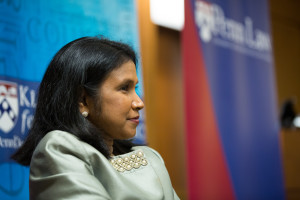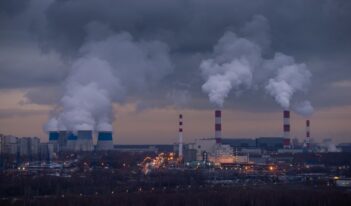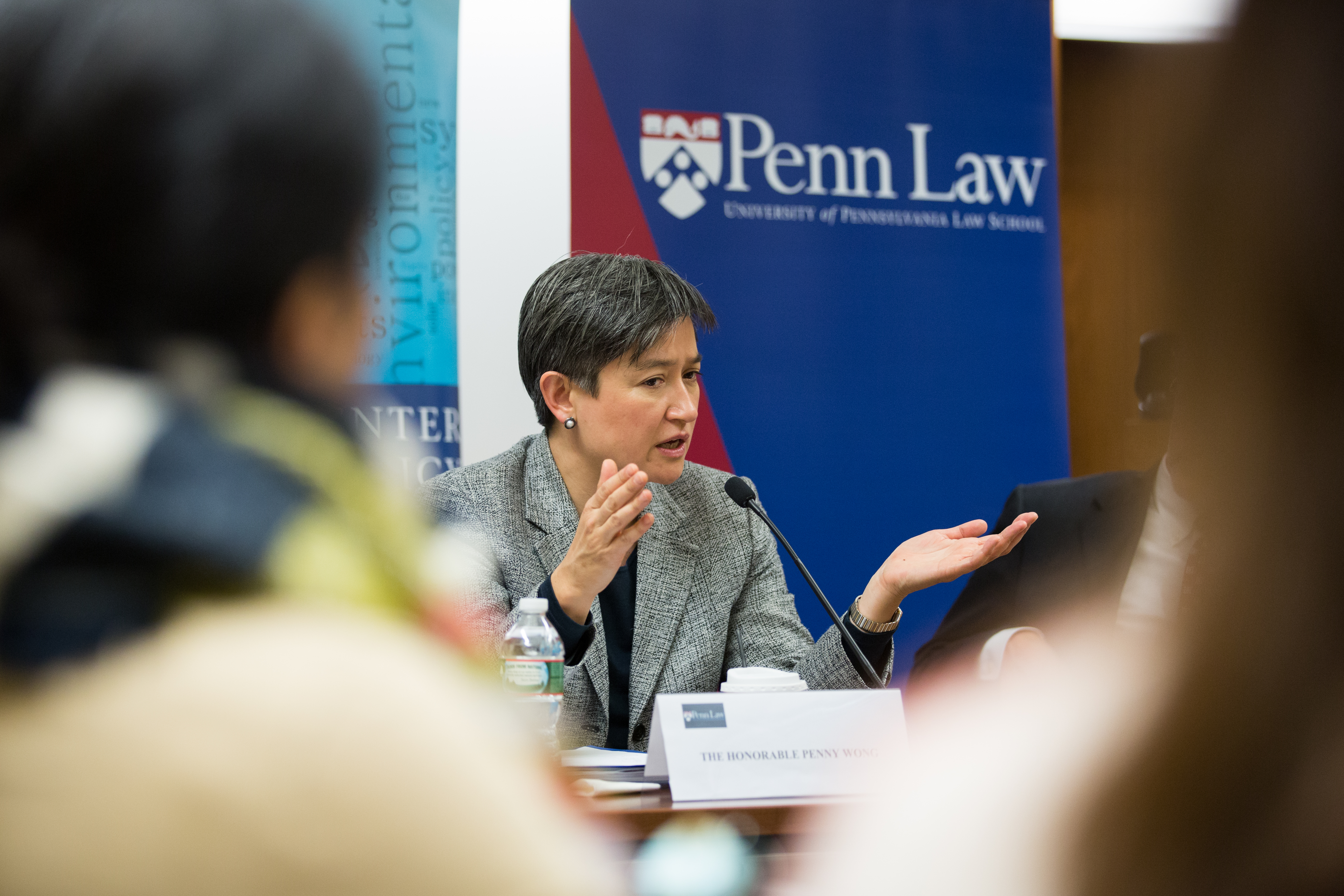
Australian senator speaks at Penn Law on creating an international climate agreement.
In advance of the recent round of climate change negotiations in Paris, French President Francois Hollande emphasized the importance of the summit, reportedly stating “never have the stakes been so high because this is about the future of the planet, the future of life.”
President Hollande has not been the only politician with high expectations for this year’s climate summit. In a recent discussion at the University of Pennsylvania Law School, Australian Senator Penny Wong offered her thoughts on how to achieve a successful outcome at the Paris climate conference and how to avoid the failures that have plagued past attempts to create a binding international climate agreement.
Senator Wong opened the discussion by reflecting on her experience at the 2009 climate summit in Copenhagen. Wong recalled her optimism as the Copenhagen discussions began, believing that the world leaders gathered there were capable of doing anything. However, as the Copenhagen negotiations concluded, it was clear that the transformative agreement that Wong and many others hoped for had not been realized.
Even with the failure at Copenhagen, Wong remains hopeful for this year’s climate change negotiations and used her remarks to highlight important themes in climate negotiations as well as what can be done to create an effective climate agreement.
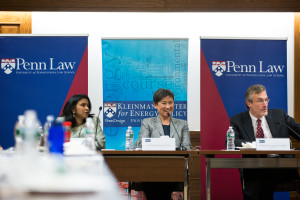
Senator Wong delivers remarks on climate change at event hosted by PPR, the Penn Law Office of International Programs, and the Kleinman Center for Energy Policy
First, Wong stressed the limits of multilateralism in delivering an agreement ambitious enough to reduce carbon emissions by any significant amount. Wong characterized multilateral agreements as top-down, legally binding, consensus-driven agreements with almost universal participation from countries. Although this approach garners wide participation, Wong worried the consensus requirement allows a small number of countries to disrupt the creation of an effective agreement.
Wong compared the multilateral approach with what she called “aggregate climate governance.” Aggregate climate governance focuses on reducing emissions through regional, national, and local level arrangements, and through the actions of other actors like businesses and individuals. Wong believes this approach does not carry the same risk of disruption by a small number of countries and could serve as a valuable way to supplement the existing multilateral approach to climate negotiations.
With the aggregate approach, bilateral agreements between developed and developing countries are crucial for future climate negotiations, Wong emphasized. She noted the importance of the United States and China’s joint statement on climate change from earlier this year, which announced both countries’ commitments to reducing domestic carbon emissions. These types of agreements, she said, can help align the climate goals of the developing and developed world.
Whatever the outcome of the Paris talks, Wong believes that any agreement must prioritize wide participation and ambitious emission reductions commitments from individual countries. To facilitate these ambitious commitments, Wong opined that the agreement should be dynamic and should encourage countries to reevaluate and periodically revise any emissions targets it establishes.
A second issue that Wong explored was the need for a climate agreement that acknowledges individual countries’ economic imperatives. Looking back on Copenhagen, Wong identified the perceived inequality in climate change negotiations as a fundamental cause of the failure of those negotiations. The world’s richest countries produced the majority of global carbon emissions to date while they were industrializing. Developing countries find it unfair if they must curtail their own industrialization and economic growth to fix the problem.
Wong noted that as long as countries believe carbon emissions are inherently linked to economic growth it will hamper the ability to reach coordinated action. Wong believes that countries must be shown that they have a clear avenue for development without heavy carbon emissions. This goes far beyond platitudes about “green jobs.” It requires investment in a low-carbon economy based on renewable energy, new technologies, and energy efficiencies that will also allow a country to grow its economy.
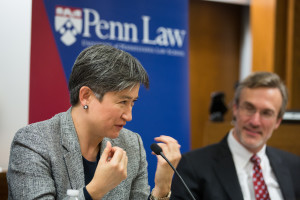
Senator Wong shares her perspective on international climate talks and how to avoid the mistakes of the past
Finally, Wong addressed financing, a key part to the successful implementation of any climate change agreement. Any large-scale changes toward a low-carbon economy will require funding, which is more available to some countries than others.
As a result of the Copenhagen discussions, developed countries pledged to provide $100 billion dollars in financing to developing countries by 2020. By 2014, developed countries had raised $62 billion dollars, with the majority coming from public sources. Although Wong acknowledged the role of public-sector financing in the transition to a low-carbon economy, she noted that private-sector financing must increase in order to meet the future need for new technologies and adaptation techniques.
Wong ended her talk with a call for action, voicing her hopes that low-levels of domestic ambition will not impede this opportunity to create an effective and binding climate agreement. In anticipation of the Paris negotiations, 150 counties released their domestic plans to reduce carbon emissions. However, the combined effect of these plans would still lead to global emissions levels significantly higher than the levels recommended by climate scientists.
Senator Wong’s visit was hosted by the Penn Program on Regulation, the University of Pennsylvania Law School’s Office of International Programs, and the Kleinman Center for Energy Policy.

